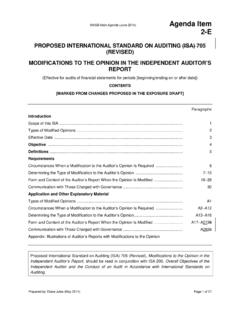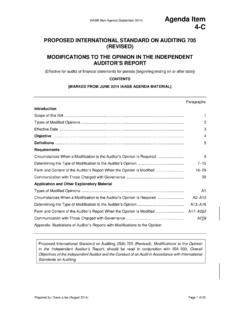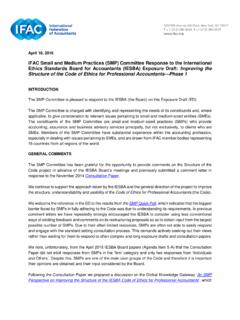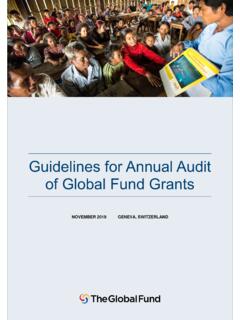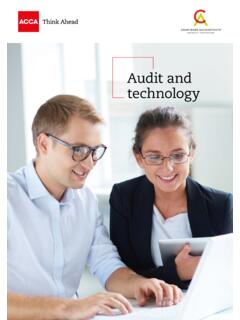Transcription of Enhancing Auditor Professional Skepticism - IFAC
1 BY Professors Steven M. Glover and Douglas F. Prawitt, Brigham Young UniversityEnhancing Auditor Professional SkepticismContentsii Executive Summary1 Definition and Application of Professional Skepticism7 Threats, Mitigating Factors, and Suggestions to Enhance the Application of Professional Skepticism18 What Can Other Stakeholders in the Financial Reporting Process Do to Enhance Auditor Professional Skepticism ?23 ConclusionFunding for this project was provided by the Standards Working Group (SWG) of the Global Public Policy Committee (GPPC).
2 However, the views expressed in this paper and its contents are those of the authors and do not necessarily reflect the views of each network in the Auditor Professional Skepticism iNovember, 2013 Dear Friend of the GPPC, Professional Skepticism is a topic of great importance to the audit profession, audit regulators, audit standard setters and others who work in the audit arena for the benefit of the public interest. The term Professional Skepticism is widely used but may mean different things to different organizations and individuals.
3 The Standards Working Group (SWG) of the Global Public Policy Committee (GPPC) (comprising BDO, Deloitte, Ernst & Young, Grant Thornton, KPMG and PricewaterhouseCoopers) has sought to develop additional thinking and research that contributes to the dialogue on this important topic. Accordingly, the SWG commissioned the enclosed publication Enhancing Auditor Professional Skepticism , which was written by Professors Steven M. Glover and Douglas F. Prawitt of Brigham Young University. The publication considers the importance of developing a shared understanding of what Professional Skepticism is, how it should be applied, the threats to Professional Skepticism and the safeguards that may be cost effective.
4 It provides some ideas and recommendations on how the application of Professional Skepticism might be enhanced by auditors, as well as briefly indicating how other key stakeholders can also contribute to its effective application. The thoughts in the publication do not necessarily reflect the views of each network in the GPPC and are not intended as recommendations or application guidance; rather, they are intended to provoke further thought and discussion, with the objective of Enhancing the consistent, appropriate application of Professional Skepticism in practice, and, ultimately, improving audit quality.
5 In particular, the GPPC networks do not have a common view on all aspects of the EU audit market would be pleased to meet with you and your colleagues from your organization to discuss this topic and consider how best to take forward further debate and careful consideration of this paper and the general subject of Enhancing Auditor Skepticism . Please contact the secretary of the SWG, Angela Green in the first instance and she will forward your inquiry appropriately. Yours sincerely, David Devlin Steve Maslin Chair, SWG Chair, GPPCii Professors Steven M.
6 Glover and Douglas F. Prawitt, Brigham Young UniversityExecutive SummaryThe Standards Working Group (SWG) of the Global Public Policy Committee of the six largest global accounting networks is committed to improving the quality of financial statement audits and as such has a keen interest in advancing the understanding and application of Professional Skepticism . The SWG accordingly commissioned leading academics to produce this thought leadership paper. The purpose of the paper is to facilitate an ongoing discussion between the profession, standard setters, regulators, investors, audit committees, and other interested stakeholders.
7 While the SWG believes this paper accomplishes that objective, not all of the views expressed in this paper necessarily represent the views of individual networks represented in the SWG. The application of Professional Skepticism by auditors is important to audit quality. However, various definitions of, and perspectives on, Professional Skepticism exist in the auditing literature. To move the dialogue on improving the consistent appropriate application of Professional Skepticism forward, it is important that a shared understanding be developed regarding what Professional Skepticism is, how it should be applied and documented in various situations, and how threats to Professional Skepticism manifest themselves at different structural levels.
8 It is also important to take into account the efforts and safeguards already in place to increase the likelihood that new initiatives will bring incremental improvement and that their benefits will exceed their costs. We propose a Professional Skepticism continuum that acknowledges that the appropriate application of Professional Skepticism will depend on the risk characteristics of the account and assertion. We also lay out the different structural levels at which Professional Skepticism is applied and at which threats can arise.
9 We propose that efforts to mitigate threats to the appropriate application of Professional Skepticism are more likely to be effective if they take into account the distinct nature of the different structural levels. Finally, we provide some ideas and recommendations on how the application of Professional Skepticism might be enhanced on the part of auditors as well as how other key stakeholders can contribute to its effective application. The thoughts presented for consideration in this paper are not intended as concrete recommendations or specific application guidance.
10 Rather, they are intended to provoke further thought and discussion, with the objective of Enhancing the consistent, appropriate application of Professional Skepticism in practice, and, ultimately, improving audit purpose of the paper is to facilitate an ongoing discussion between the profession, standard setters, regulators, investors, audit committees, and other interested Auditor Professional Skepticism 1 Definition and Application of Professional SkepticismReliable financial information is vital to investor confidence in the capital markets.


